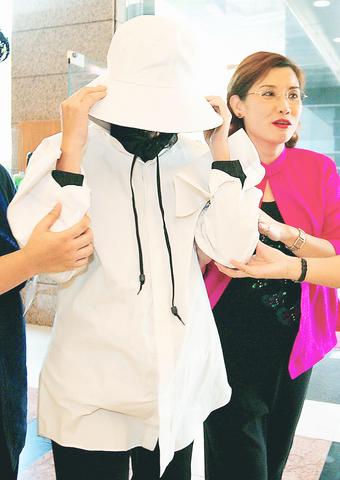Four women yesterday accused a Taipei-based Paraguayan diplomat of knowingly giving them a venereal disease -- a charge the official reportedly denies.
According to PFP lawmaker Li Yong-ping (

PHOTO: CHU YU-PING, TAIPEI TIMES
The allegations were made yesterday amidst a state visit by Paraguayan President Luis Angel Gonzalez Macchi.
"One of the victims, a graduate student, tried to end her life last night after seeking unsuccessfully to address her grievances," Li said, identifying the Paraguayan diplomat as Ruben Dario Benitez Palma.
Li said the four women claim that the diplomat's promiscuity is widely known in Taipei.
Before the suicide attempt, the woman also wrote President Chen Shui-bian (
"How pathetic it is to be a Taiwanese," her suicide note stated. "Because as one, you can never have any injustice redressed."
Earlier, the woman and another venereal-disease sufferer sought to lodge a complaint with the Paraguayan embassy, which turned down their request to call Benitez and gave them a tongue-lashing, according to Li.
"The Paraguayan embassy said the whole incident was no big deal as it involved only four women," Li quoted the venereal-disease sufferers as saying. "Also, it called the women's moral conduct into question and said the women could have passed the disease to its diplomat instead."
The lawmaker claim Benitez is fully aware of his health condition, as another one of the women -- who has a medical background -- accompanied him to a local hospital for treatment last year.
But the diplomat refused to receive treatment and started having sex with unknowing women, according to Li.
Benitez reportedly has denied to his colleagues contracting any venereal disease and backs up his contention with a health certificate. The Paraguay Embassy said Benitez will be removed from Taiwan in the coming few days.

MORE VISITORS: The Tourism Administration said that it is seeing positive prospects in its efforts to expand the tourism market in North America and Europe Taiwan has been ranked as the cheapest place in the world to travel to this year, based on a list recommended by NerdWallet. The San Francisco-based personal finance company said that Taiwan topped the list of 16 nations it chose for budget travelers because US tourists do not need visas and travelers can easily have a good meal for less than US$10. A bus ride in Taipei costs just under US$0.50, while subway rides start at US$0.60, the firm said, adding that public transportation in Taiwan is easy to navigate. The firm also called Taiwan a “food lover’s paradise,” citing inexpensive breakfast stalls

TRADE: A mandatory declaration of origin for manufactured goods bound for the US is to take effect on May 7 to block China from exploiting Taiwan’s trade channels All products manufactured in Taiwan and exported to the US must include a signed declaration of origin starting on May 7, the Bureau of Foreign Trade announced yesterday. US President Donald Trump on April 2 imposed a 32 percent tariff on imports from Taiwan, but one week later announced a 90-day pause on its implementation. However, a universal 10 percent tariff was immediately applied to most imports from around the world. On April 12, the Trump administration further exempted computers, smartphones and semiconductors from the new tariffs. In response, President William Lai’s (賴清德) administration has introduced a series of countermeasures to support affected

CROSS-STRAIT: The vast majority of Taiwanese support maintaining the ‘status quo,’ while concern is rising about Beijing’s influence operations More than eight out of 10 Taiwanese reject Beijing’s “one country, two systems” framework for cross-strait relations, according to a survey released by the Mainland Affairs Council (MAC) on Thursday. The MAC’s latest quarterly survey found that 84.4 percent of respondents opposed Beijing’s “one country, two systems” formula for handling cross-strait relations — a figure consistent with past polling. Over the past three years, opposition to the framework has remained high, ranging from a low of 83.6 percent in April 2023 to a peak of 89.6 percent in April last year. In the most recent poll, 82.5 percent also rejected China’s

PLUGGING HOLES: The amendments would bring the legislation in line with systems found in other countries such as Japan and the US, Legislator Chen Kuan-ting said Democratic Progressive Party (DPP) Legislator Chen Kuan-ting (陳冠廷) has proposed amending national security legislation amid a spate of espionage cases. Potential gaps in security vetting procedures for personnel with access to sensitive information prompted him to propose the amendments, which would introduce changes to Article 14 of the Classified National Security Information Protection Act (國家機密保護法), Chen said yesterday. The proposal, which aims to enhance interagency vetting procedures and reduce the risk of classified information leaks, would establish a comprehensive security clearance system in Taiwan, he said. The amendment would require character and loyalty checks for civil servants and intelligence personnel prior to